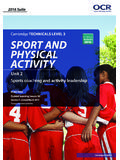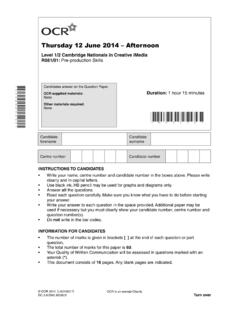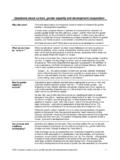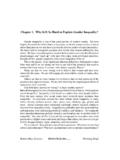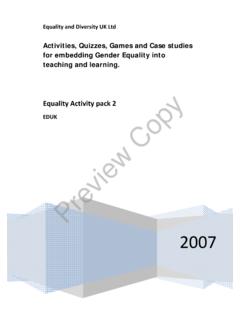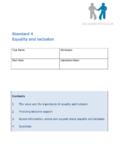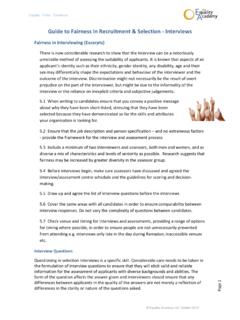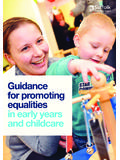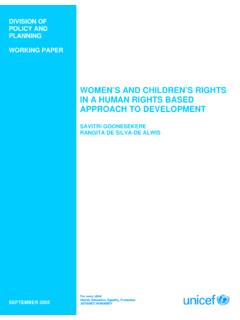Transcription of CERTIFICATE/DIPLOMA IN HEALTH AND SOCIAL …
1 equality , DIVERSITY AND RIGHTS IN HEALTH AND SOCIAL CARED/600/9222 LEVEL 3 UNIT 2 GUIDED LEARNING HOURS: 60 UNIT CREDIT VALUE: 10 OCR LEVEL 3 CAMBRIDGE TECHNICALCERTIFICATE/ diploma INHEALTH AND SOCIAL , DIVERSITY AND RIGHTS IN HEALTH AND SOCIAL CARED/600/9222 LEVEL 3 UNIT 2 AIM OF THE UNITTo provide effective care practitioners must have a good knowledge and understanding of the diversity that exists amongst people in society. Many individuals who need HEALTH , SOCIAL or early years services can be vulnerable and dependent on others; this means that practitioners attitudes, values and prejudices can significantly affect the quality of care people who use services unit will help learners to appreciate the implications of diversity on practice and also the effects of discriminatory practice on people who use services.
2 Learners will also gain an appreciation of how legislation, national initiatives and policy guidelines can support anti-discriminatory OF THE UNIT Effective HEALTH and SOCIAL care practice recognises and adapts to society and the needs of individuals within it. British society is extremely diverse, it is essential that service providers acknowledge this in order to gain an understanding of the implications of diversity in terms of equality and individual rights. This unit will help the learner to establish this understanding by focussing on issues of discrimination and discriminatory practice.
3 The effects of discriminatory practice will be explored and the potential impact upon people who use services. Strategies used to promote anti-discriminatory practice will be addressed in terms of the role of legislation, codes of practice and working procedures in providing appropriate standards of support and , Diversity and Rights in HEALTH and SOCIAL Care Level 3 Unit 21 Understand concepts of equality , diversity and rights in relation to HEALTH and SOCIAL care2 Know discriminatory practices in HEALTH and SOCIAL care3 Understand how national initiatives promote anti-discriminatory practice4 Know how anti-discriminatory practice is promoted in HEALTH and SOCIAL care settingsP1 explain the concepts of equality .
4 Diversity and rights in relation to HEALTH and SOCIAL careP2 describe discriminatory practice in HEALTH and SOCIAL careP3 describe the potential effects of discriminatory practice on those who use HEALTH or SOCIAL care servicesP4 explain how national initiatives promote anti-discriminatory practice P5 describe how anti-discriminatory practice is promoted in HEALTH and SOCIAL care settingsM1 describe how practitioners should apply values of care in a HEALTH or SOCIAL care serviceM2 explain the possible impact of the Disability Discrimination Act in promoting anti-discriminatory practiceM3 describe ways HEALTH or SOCIAL care settings use national initiatives to promote anti-discriminatory practiceD1 analyse the benefits of understanding diversity in relation to HEALTH and SOCIAL careD2 evaluate the effectiveness of national initiatives in promoting anti-discriminatory practiceASSESSMENT AND GRADING CRITERIAL earning Outcome (LO)
5 Pass Merit Distinction The assessment criteria are To achieve a merit the To achieve a distinction the pass requirements for evidence must show that, the evidence must show this unit. in addition to the pass that, in addition to the pass criteria, the learner is able to: and merit criteria, the The learner will: The learner can: learner is able to: CONTENT1 Understand concepts of equality , diversity and rights in relation to HEALTH and SOCIAL care SOCIAL , cultural and economic diversity: ( faith, gender , sexuality, age, family structure, SOCIAL class, language, dress, food, music, the arts, education, employment, expertise) equality and rights.
6 ( right to be respected, treated with equality , and fairly, respected as an individual and not discriminated against, privacy, dignity, protection from danger and harm; right to access information relevant to themselves; right to communicate using their preferred methods of communication and language; right to be cared for in a manner that takes account of their needs, choices, preferences) Values of care, HEALTH and SOCIAL care settings: promoting equality and diversity of people who use services; promoting individual rights and beliefs; maintaining confidentiality Values of care, early years settings: ( making the welfare of the child paramount; keeping children safe and maintaining a healthy environment; working in partnership with parents/families; supporting children s learning and development; valuing diversity; equality of opportunity and anti-discriminatory practice; maintaining confidentiality; working with others.)
7 Reflective practitioners) Benefits of understanding diversity: ( empowerment, independence, inclusion, equality , respect, dignity, opportunity, access, participation, anti-discriminatory practice) Correct use of terminology: ( equality , diversity, rights, opportunity, difference, discrimination, (this may be direct or indirect) stereotyping, labelling, prejudice, disadvantage, culture, beliefs, values, expectations, empowerment, independence, vulnerability, abuse, interdependence, racism, sexism, ageism and homophobia) HEALTH and SOCIAL care settings: these include residential care, day care, nursing care, domiciliary care and early years Know discriminatory practice in HEALTH and SOCIAL care Basis of discrimination.
8 The factors that may incite discrimination or discriminatory behaviour, ( culture, race, disabilities, cognitive ability, SOCIAL class, age, gender , sexuality, HEALTH status, family status and structure, for example lone parents, same sex couples) Discriminatory practice: ( infringement of rights, the various types of abuse, the covert or overt abuse of power, bullying, prejudice, stereotyping and labelling) Effects of discriminatory practice: ( disempowerment, low self-esteem and self-confidence, marginalisation, restricted opportunities, unemployment, lack of SOCIAL cohesion, negative behaviours such as violence or criminality, loss of rights).
9 3 Understand how national initiatives promote anti-discriminatory practice in HEALTH and SOCIAL care Conventions, legislation and regulations ( Sex Discrimination Act 1975, Mental HEALTH Act 1983, Mental HEALTH (Northern Ireland) Order 1986, The Convention on the Rights of the Child 1989, The Children Act 2004, Race Relations (Amendment) Act 2000, Disability Discrimination Act 1995, Human Rights Act 1998, Data Protection Act 1998, Nursing and Residential Care Homes Regulations 1984 (amended 2002), Care Standards Act 2000, The Children Act 2004, Disability Discrimination Act 2005, Mental Capacity Act 2005, Age Discrimination Act 2006, equality Act 2010) Codes of practice and charters: codes of conduct established by professional bodies which include, General SOCIAL Care Council/Care Council for Wales/Northern Ireland SOCIAL Care Council codes of practice and rules of conduct for SOCIAL care workers and employers.
10 Charters, ( entitlement to services) Quality assurance: ( inspections such as Ofsted, CQC (Care Quality Commission) Organisational policies and procedures: Policies ( equal opportunities, bullying, harassment, confidentiality, HEALTH and safety); Procedures ( work practices, positive promotion of individual rights, advocacy; staff recruitment, development and training; complaints procedures)5 equality , Diversity and Rights in HEALTH and SOCIAL Care Level 3 Unit 2 Impact of national initiatives: ( person-centred approach to care and provision, individual needs met, rights upheld, privacy, safety, empowerment, independence, provides a system of redress, clear guidelines for practitioners to follow, raises standards of care, gives consistency of care).)


